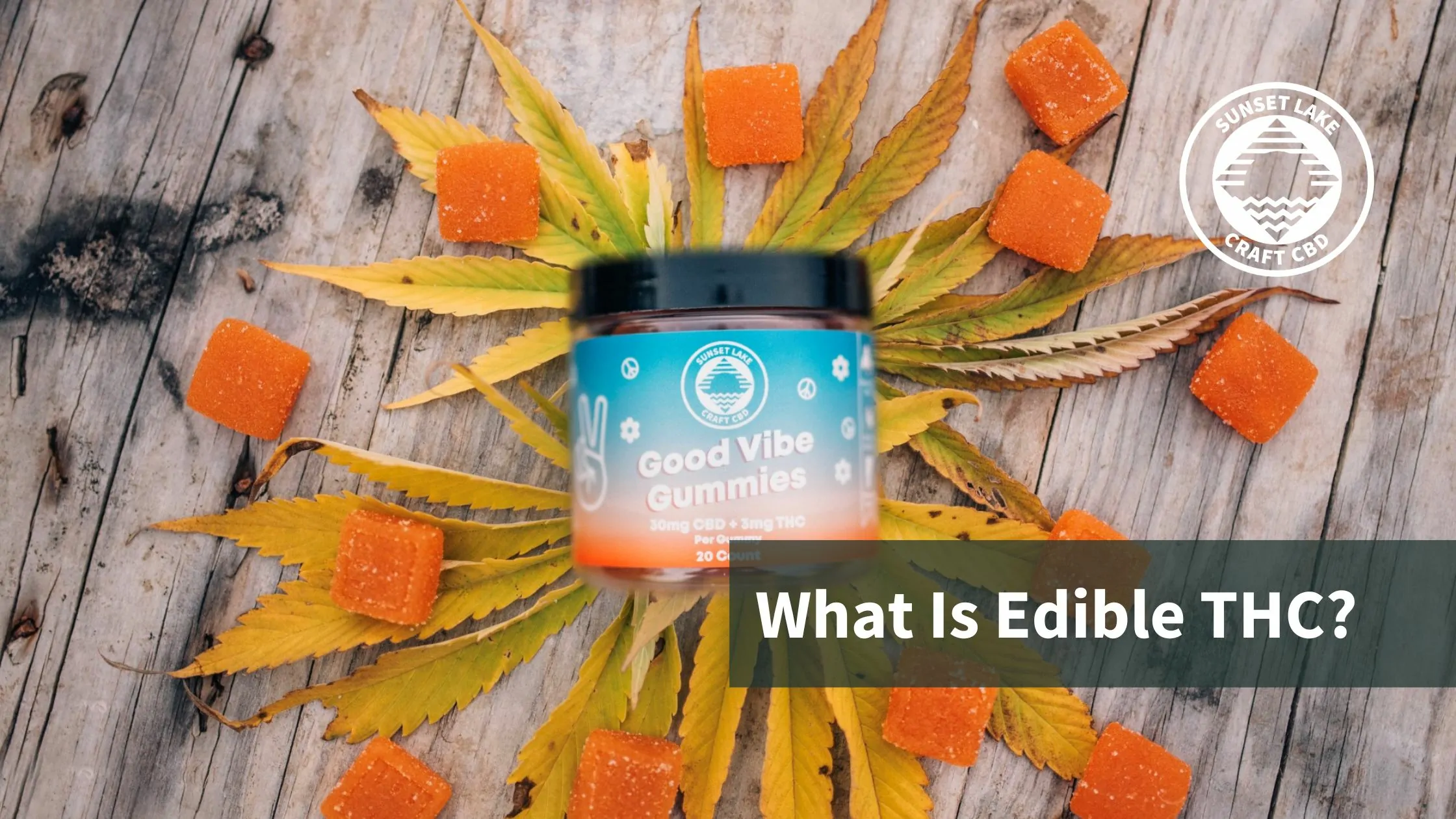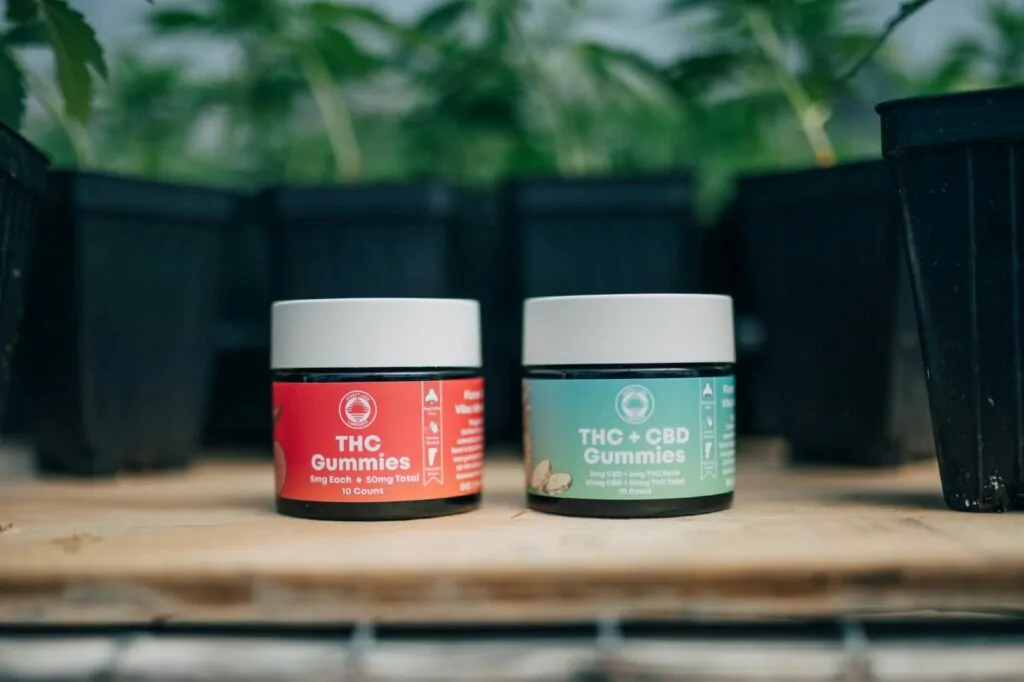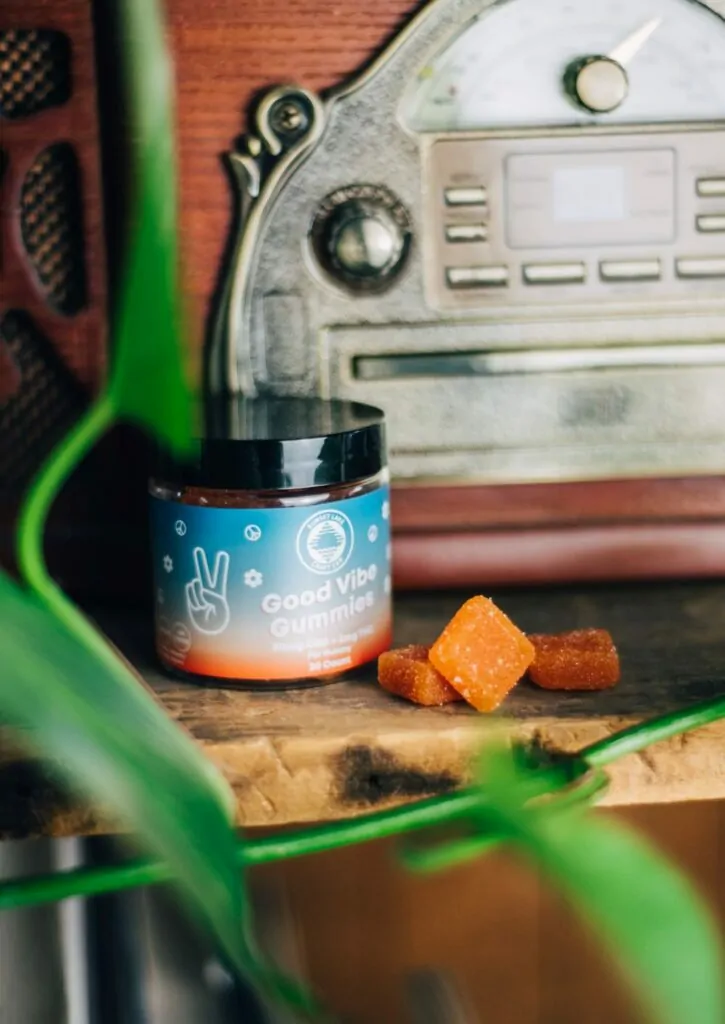No products in the cart.
What Is Edible THC? 5 Tips On How To Safely Enjoy Edibles

Edible THC products are becoming more popular in today’s hemp market. You may have found this blog while looking for gummies infused with hemp-derived THC.
Have you ever wondered why edible THC seems to be more powerful than inhaled THC? You’re in luck. We’ll cover that and the following in this post.
Contents
- What edible THC is
- The pros and cons
- How to read your product label
- How to safely enjoy your edible THC
What Is Edible THC?
Edible THC is delta-9 THC that’s been infused into baked goods, drinks, or other edible food products. Because THC and other cannabinoids like CBD and CBG are fat soluble, it’s possible to infuse them into cooking oils and edible products. In some states where recreational THC products are legal, individuals can purchase ready-made edibles made with THC-infused coconut oil, butter, or alcohol.
It’s also possible to make your own THC edibles at home. You just need to secure the prerequisite cannabis flower and something to infuse like unsalted butter, coconut oil, or high-proof ethanol.
If you’re searching for low-potency, hemp-derived edible products, be sure to see Sunset Lake CBD’s Full Spectrum CBD Vibe Gummies. Each gummy contains 1mg of edible THC and 30mg of edible CBD.
How Is Edible THC Different Than Inhaled THC?
Edible THC is different than inhaled THC because of the way your body metabolizes it.
When you smoke or vaporize cannabis, you inhale rapidly decarboxylated cannabinoids. They travel to your lungs and enter your bloodstream via a network of capillaries. The onset of effects is almost immediate— some research suggests that inhaled cannabinoids, and THC in particular, reach peak concentration in your blood three minutes after inhalation. This early peak and fall is the reason that users experience a sharp intoxication shortly after inhalation and the effects fade in 2-3 hours.
Edible THC must first travel to your liver before it enters your bloodstream. This can sometimes take 1-2 hours based on factors like if you’ve eaten before your edible and your metabolism.
When it reaches your liver, enzymes break delta-9 THC down into a more powerful form of THC called 11-hydroxy tetrahydrocannabinol.
What Is 11-Hydroxy THC?
11-Hydroxy-THC is a cannabinoid that isn’t found in the raw cannabis plant. It’s a THC metabolite that your liver produces when you eat edible THC.
As of right now, not much is known about 11-OH-THC, though research suggests that it’s between 2 to 4 times more potent than delta-9 THC, meaning that 5mg of edible delta-9 THC can feel like 20mg once it’s broken down by your liver.
Why Does Edible THC Last Longer Than Inhaled THC?
The effects you feel from edibles last longer because it takes the THC that much longer to get into your bloodstream than it does when you inhale it. It must first be broken down by your liver into 11-OH-THC and enter your bloodstream. This slow onset of effects (and higher intoxication level) will ultimately make for a smoother transition into intoxication, but turns into a much longer “high.”
The Pros Of Edibles
Edible THC has many benefits, though some depend on your situation.
- Edibles are a much better option for people with respiratory and cardiovascular conditions. Even if you don’t fall into this category, it’s a great way to avoid the hassle of smoking cannabis.
- With each passing year, companies are infusing THC (and cannabinoids) into more and more products. With a bit of searching, you can find hemp-derived THC infused into candy products, baked goods, seltzers, coffee, and much more.
- If you’re more of a do-it-yourself person, it’s quite easy to make edibles at home. You just need a few tools and some cannabis.
- The effects of edibles last much longer than other methods. This can be a great benefit for folks who suffer from chronic pains or need constant dosing.
- As opposed to inhalation, edibles are more discreet. Everyone will notice if you start smoking cannabis in a public space, but no one will care if you eat a gummy.
- Edible THC has a much more gradual come up than inhalation. If you aren’t a fan of the immediate intoxication you get from smoking, look into edible THC.
The Cons Of Edibles
Almost all of the benefits of edible THC are double-edged in some way. It’s up to each individual to evaluate and determine whether or not edible THC is a good option.
- Edibles aren’t a time-efficient way of consuming THC. Depending on your metabolism, the last time you ate, and the dose, it can take up to two hours to feel any effect.
- This con can cause some to “dose-stack” meaning that before the first dose has kicked in, one takes another and overindulges. Stacking doses can increase an individual’s likelihood of experiencing some unwanted side effects.
- Because edibles are becoming more and more advanced, it’s becoming difficult to even detect the presence of cannabis in an infused product. This can also lead to overindulgence and dose stacking.
- Edibles aren’t always dosed properly, meaning some products you buy can sometimes have much more or much less THC than advertised. This inconsistency can make it hard for folks to find their preferred dose.
- Keeping edible THC in a home with children isn’t advisable. Most pediatric hospitalizations for THC are the result of kids finding their parent’s edibles.
- Edible THC can also appear on drug tests. If you are subject to random screenings or think you will be in the coming weeks, do not consume edible THC.
What Are The Side Effects?
Because 11-hydroxy THC is more potent than inhaled delta-9 THC, it’s more likely that individuals who eat too much edible THC are likely to experience side effects like:
- Cognitive and motor function impairment
- Extreme sedation
- Anxiety
- Cardiac stress
- Upset stomach and vomiting
- Extreme time dilation

How To Read Your Edible Label
There aren’t any federal labeling standards for edible THC products yet, so labels can be unreliable and vastly different from place to place.
There are two numbers you need to look for on your product before you buy:
- The milligram (mg) dose of THC in each serving/product
- The ratio of CBD to THC (or THC to CBD)
On some full-spectrum edible products, you’ll see CBD and THC expressed as a ratio of 1:1, 1:5, or 1:20. These ratios can mean different things in different places.
In some states where recreational cannabis is legal like New York, the THC is the first number in the ratio. A product described as 1:5 will have 1mg of THC for every 5mg of CBD. That same product in Colorado will have 5mg of THC for every 1mg of CBD where they have the reverse standards.
In Vermont, we have yet to establish a set ratio meaning you should always ask to see the product’s certificate of analysis before you make a purchase. This paperwork should tell you just how much THC, CBD, and other cannabinoids are in your product.
For more on reading certificates of analysis, read our guide here.
5 Tips For Safely Consuming Edible THC
If you’re considering edible products, you should know some tips to help you have a happy, healthy, and safe time. The cardinal rule is: Start low and go slow. Patience is key.
Some other, equally important tips include:
- Don’t stack your doses. Start with a small dose in order to know how you react. Observe how you feel and how your body handles the experience. Once you’re comfortable, adjust your dosage incrementally the next time you indulge.
- If you plan to make edibles, use a dosage calculator. Read our dos-and-don’ts guide to help get you started.
- And be sure to decarboxylate your material first. Otherwise, your infusion will be a total waste.
- Plan ahead and consume in a safe space. Do not drive or operate heavy machinery after you consume THC.
- Make sure to lock up your edibles so that they are completely inaccessible to your pets and children.
- Don’t mix edibles with any other substances or with alcohol. And definitely don’t eat any THC if you’re pregnant or breastfeeding.
Edible THC can be a great way to enhance your experiences with cannabis. Edibles are tasty, discreet, and under the right circumstances, can be very relaxing. Just be sure to adhere to the cardinal rule of low and slow, and make sure that your edibles don’t fall into the wrong hands.

